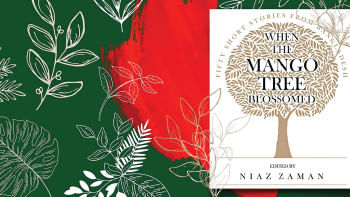Niaz Zaman's 'An Ekushey Anthology': Reminiscing Ekushey, 70 years on

Twenty five literary pieces, consisting of nine poems, 15 stories, and a play, make up An Ekushey Anthology 1952-2022 (writers.ink, 2022), a noble endeavour undertaken by Niaz Zaman, a noted educationist, prolific writer, publisher, and an indefatigable literary figure. The eventual birth of Bangladesh may be traced back to the debasement of its key cultural make-up, its language, Bangla, and Zaman has thoughtfully striven to bring out the anthology on the 70th anniversary of Ekushey February, the date that marks the beginning of the end of the Pakistan on August 15, 1947, and the emergence of Bangladesh as a sovereign independent nation-state on March 26, 1971.
The 25 pieces are made up of four in the original English, and the rest 21 in English translated from the original Bangla. The translators, with the odd exceptions, have done a commendable job in presenting the works of some accomplished writers like Anisuzzaman, Asad Chowdhury, Jahanara Arzoo, Abdul Gaffar Chowdhury, Zahir Raihan, Selina Hossain, Shaukat Osman, Bimal Guha, Hasan Hafizur Rahman, Jharna Das Purkayastha, et.al. Niaz Zaman herself has translated five pieces, besides writing the preface and signing off on the book with the story "My Friend, My Enemy". Noora Shamsi Bahar has translated a couple, Kabir Chowdhury three, and Hasan Ameen Salahuddin, Khondakar Ashraf Hossain, Junaidul Haque, Bashabi Fraser have done one apiece.
Zaman has provided an informative preface to her endeavour, including this sharp observation on generational change: "While the observances at the Shaheed Minar have become stultified—and the day even become an occasion for lovers to meet—the significance of the Language Movement can never be
forgotten."
Another of Zaman's observations is intriguing in its broad implications: "Ekushey February today is no longer just a national observance but, as International Mother Language Day, a worldwide celebration of the diversity of human languages and the need to preserve endangered languages." This point may well play the squirrel in some minds: How many political leaders in various official, or unofficial, capacities, let alone the general citizenry, across the globe have even the knowledge of the existence of International Mother Language Day, much less what it signifies? Ekushey February will remain in the hearts and minds of Bangladeshis and Bangalis from generation to generation, and the 25 writings in the book depict, in various degrees of competence, that particular point.
Interestingly, though, one poem in the anthology, Mohammad Nurul Huda's "Suddenly Ma", looks to embrace other languages along with his own:
"Holding my mother language within my bosom,
I embrace the language of every mother
With all my heart."
Similarly, Saleha Chowdhury's interesting piece contains this cryptic observation pregnant with multiple indications: "It is amazing that 21 consonants and five vowels make the world go round. What would we do without the English language?"
Zaman has classified the pieces in two groups: "the early stories focus on the events that took place on 21 February—the processions, the police action and the deaths—while the later ones show how the attitude to Bangla has changed in these 70 years." This last point, to reiterate, is something to track down the years.
The offerings in the book, to repeat, are generally of good quality, with some going down the lane of hyper-emotion, a not uncommon Bangali trait. Anisuzzaman's "Eyesight" is a poignant tale of a martyr told through his blind father. Jahanara Arzoo's poem, "This Smouldering Fire", is emotive as it speaks of "The lands of Kanupa, Chandidas, Rabindra, Nazrul, Of Mahua and Madhumalati."
Saleha Chowdhury's "Talking Their Hearts Out" is an interesting piece that encompasses a protagonist from Poshchimbongo, the other region that speaks Bangla. Mozaffer Hossain's "An Ad Seeking the Identity of a Hand" is an unusual treatment of a matter related to Ekushey, and is dedicated by the author to a veteran of the Bangla Language Movement, Rawshan Ara Bachchu.
All of their writings, and the unusual approach they adopt, enrich the overall quality of An Ekushey Anthology. Jharna Das Purkayastha, in "The Journey of Shamim Akhtar", dwells on the conflict that different generations, including of the same family, experience, precisely because of the dynamics of the inevitabilities of generational change. The editor of the book, Niaz Zaman, rounds off her editing effort by presenting her story "My Friend, My Enemy", which she has dedicated to Halima Khatun, who was in the forefront of the procession that defied Section 144 on February 21, 1952. Zaman, through her protagonist, posits: "And Urdu—is not the mother tongue of most West Pakistanis. If anything, it is an Indian language. It used to be called Hindustani at one time."
An Ekushey Anthology should be an enjoyable, and informative, read.
GM Shahidul Alam is an Adjunct Professor In the Media and Communication department, IUB.

 For all latest news, follow The Daily Star's Google News channel.
For all latest news, follow The Daily Star's Google News channel. 










Comments